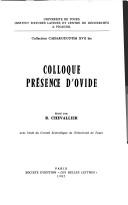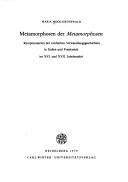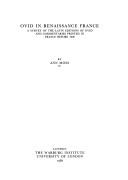| Listing 1 - 10 of 91 | << page >> |
Sort by
|

ISBN: 2251691073 9782251691077 Year: 1982 Volume: 17 bis Publisher: Paris: Les Belles Lettres,
Abstract | Keywords | Export | Availability | Bookmark
 Loading...
Loading...Choose an application
- Reference Manager
- EndNote
- RefWorks (Direct export to RefWorks)
Ovid, --- Influence --- Congresses --- Congresses. --- Ovide. (Congrès) --- Ovidius. (Congres)
Book
ISBN: 3825377563 9783825377564 9783825367886 3825367886 Year: 2018 Volume: 157 Publisher: Heidelberg, [Germany] : Universitätsverlag Winter,
Abstract | Keywords | Export | Availability | Bookmark
 Loading...
Loading...Choose an application
- Reference Manager
- EndNote
- RefWorks (Direct export to RefWorks)
This book aims to show the metamorphic nature of Ovid's reception in twentieth-century Italian literature. It is a study of the aesthetic effects of Ovid's poetics within both the novel and poetry tradition in Italy. By using a historical and philological methodology, the authors of each essay have shown the hermeneutic power of Ovid, read as a constant intertextual presence. From Giovanni Pascoli to Eugenio Montale, from Italo Calvino to Antonio Tabucchi, in this book Ovid's reception is finally shown to be as important as Virgil's and offers new important tools in order to understand the role of Latin literature in the twentieth century.
Italian literature --- Roman influences --- Ovid, --- Influence --- Influence. --- Ovidius Naso, Publius.
Book
ISBN: 9789023831648 9023831640 Year: 1994 Publisher: Amsterdam : Vrije Universiteit, Instituut voor Didactiek en Onderwijspraktijk,
Abstract | Keywords | Export | Availability | Bookmark
 Loading...
Loading...Choose an application
- Reference Manager
- EndNote
- RefWorks (Direct export to RefWorks)
Lerarenopleiding --- (vak)didactiek talen --- (vak)didactiek talen. --- Ovidius Naso, Publius --- Ovid, --- Nasó, P. Ovidi, --- Naso, Publius Ovidius, --- Nazon, --- Ouidio, --- Ovide, --- Ovidi, --- Ovidi Nasó, P., --- Ovidiĭ, --- Ovidiĭ Nazon, Publiĭ, --- Ovidio, --- Ovidio Nasón, P., --- Ovidio Nasone, Publio, --- Ovidios, --- Ovidiu, --- Ovidius Naso, P., --- Owidiusz, --- P. Ovidius Naso, --- Publiĭ Ovidiĭ Nazon, --- Publio Ovidio Nasone, --- Ūvīd, --- אוביד, --- Ovid --- Ovidius Naso, Publius,
Book
ISBN: 9780299302047 0299302040 9780299302030 0299302032 1322496765 Year: 2014 Publisher: Madison, Wisconsin : The University of Wisconsin Press,
Abstract | Keywords | Export | Availability | Bookmark
 Loading...
Loading...Choose an application
- Reference Manager
- EndNote
- RefWorks (Direct export to RefWorks)
Ovid's Art of Love (Ars Amatoria) and its sequel Remedies for Love (Remedia Amoris) are among the most notorious poems of the ancient world. In AD 8, the emperor Augustus exiled Ovid to the shores of the Black Sea for "a poem and a mistake." Whatever the mistake may have been, the poem was certainly the Ars Amatoria, which the emperor found a bit too immoral. In exile, Ovid composed Sad Things (Tristia), which included a defense of his life and work as brilliant and cheeky as his controversial love manuals. In a poem addressed to Augustus (Tristia 2), he argues, "Since all of life and literature is one long, steamy sex story, why single poor Ovid out?" While seemingly groveling at the emperor's feet, he creates an image of Augustus as capricious tyrant and himself as suffering artist that wins over every reader (except the one to whom it was addressed). Bringing together translations of the Ars Amatoria, Remedia Amoris, and Tristia 2, Julia Dyson Hejduk's The Offense of Love is the first book to include both the offense and the defense of Ovid's amatory work in a single volume. Hejduk's elegant and accurate translations, helpful notes, and comprehensive introduction will guide readers through Ovid's wickedly witty poetic tour of the literature, mythology, topography, religion, politics, and (of course) sexuality of ancient Rome.
Classical Latin literature --- Ovid, --- Translations into English. --- Nasó, P. Ovidi, --- Naso, Publius Ovidius, --- Nazon, --- Ouidio, --- Ovide, --- Ovidi, --- Ovidi Nasó, P., --- Ovidiĭ, --- Ovidiĭ Nazon, Publiĭ, --- Ovidio, --- Ovidio Nasón, P., --- Ovidio Nasone, Publio, --- Ovidios, --- Ovidiu, --- Ovidius Naso, P., --- Owidiusz, --- P. Ovidius Naso, --- Publiĭ Ovidiĭ Nazon, --- Publio Ovidio Nasone, --- Ūvīd, --- אוביד, --- Ovid --- Ovidius Naso, Publius,
Book
ISBN: 9781108482301 1108482309 9781108687027 9781108711869 1108752772 1108687024 1108639615 Year: 2019 Publisher: Cambridge : Cambridge University Press,
Abstract | Keywords | Export | Availability | Bookmark
 Loading...
Loading...Choose an application
- Reference Manager
- EndNote
- RefWorks (Direct export to RefWorks)
This book offers a fresh reading of the Amores centered on the aggressive, opportunistic, endlessly fluent, pleasure-seeking character, the poet-lover of the collection, here called Naso. Resisting the scholarly tendency to segregate the poet from the lover, Ellen Oliensis teases out the compromising affiliations between Naso's most 'poetic' performances and his seamy erotic adventures and shows that his need to write the script of his own subjection, far from delegitimizing his desire, tallies with other features of his generally masochistic profile. The book concludes with an exploration of the masochistic pleasures of the elegiac writing project as such, thereby effectively re-uniting Ovid with his surrogate within the collection.
Ovid, --- Criticism and interpretation. --- Amores (Ovid). --- Ovid --- Nasó, P. Ovidi, --- Naso, Publius Ovidius, --- Nazon, --- Ouidio, --- Ovide, --- Ovidi, --- Ovidi Nasó, P., --- Ovidiĭ, --- Ovidiĭ Nazon, Publiĭ, --- Ovidio, --- Ovidio Nasón, P., --- Ovidio Nasone, Publio, --- Ovidios, --- Ovidiu, --- Ovidius Naso, P., --- Owidiusz, --- P. Ovidius Naso, --- Publiĭ Ovidiĭ Nazon, --- Publio Ovidio Nasone, --- Ūvīd, --- אוביד, --- Ovidius Naso, Publius,
Book
ISBN: 9783825385088 9783825348533 3825348539 Year: 2022 Publisher: Heidelberg Universitätsverlag Winter
Abstract | Keywords | Export | Availability | Bookmark
 Loading...
Loading...Choose an application
- Reference Manager
- EndNote
- RefWorks (Direct export to RefWorks)
Im vorliegenden Buch wird das kulturelle Wissen des römischen Kalenders untersucht, wie es Ovid in den ‚Fasti‘ darstellt und selbst mitgestaltet. Die Studie geht von der These aus, dass das Gedicht sich in einem gemeinsamen Wissensdiskurs mit einer Reihe von poetischen wie auch historiographischen und antiquarischen Prosatexten befindet, was u. a. durch die zentrale, diesen Texten gemeinsame Gedankenfigur der Aitiologie oder Ursprungserklärung deutlich wird. Die Art und Weise dieses Zusammentreffens von Wissen und Literatur wird am Kernthema der ‚Fasti‘ dargestellt: der Geschichte der Kalenderkonstitution und der aitiologischen Erklärung der Gestalt, Ordnung und Namen des römischen Jahres. Die Studie stellt einen Beitrag zu einer literarischen Wissensgeschichte der römischen Literatur dar, ist also eine über historische Darstellungen der faktischen Ereignisse und Reformen des Kalenders hinausgehende Interpretation der poetischen Verarbeitung sozialer Zeitverhandlung in Rom.
Ovidius Naso, Publius --- Calendar --- Fasts and feasts --- Religious calendars --- Calendar in literature. --- Roman religion. --- Ovid,

ISBN: 3533027740 3533027732 9783533027737 Year: 1979 Volume: 10 Publisher: Heidelberg: Winter,
Abstract | Keywords | Export | Availability | Bookmark
 Loading...
Loading...Choose an application
- Reference Manager
- EndNote
- RefWorks (Direct export to RefWorks)
Ovid, --- Appreciation --- Fables, Latin --- Mythology, classical, in literature --- Metamorphosis in literature --- History and criticism --- 87.04 --- 7.046.1 --- 871 OVIDIUS NASO, PUBLIUS --- Klassieke literatuur: thema's --- Iconografie: klassieke mythologie --- Latijnse literatuur--OVIDIUS NASO, PUBLIUS --- 871 OVIDIUS NASO, PUBLIUS Latijnse literatuur--OVIDIUS NASO, PUBLIUS --- 7.046.1 Iconografie: klassieke mythologie --- 87.04 Klassieke literatuur: thema's --- Mythology, Classical, in literature --- Nasó, P. Ovidi, --- Naso, Publius Ovidius, --- Nazon, --- Ouidio, --- Ovide, --- Ovidi, --- Ovidi Nasó, P., --- Ovidiĭ, --- Ovidiĭ Nazon, Publiĭ, --- Ovidio, --- Ovidio Nasón, P., --- Ovidio Nasone, Publio, --- Ovidios, --- Ovidiu, --- Ovidius Naso, P., --- Ovidius Naso, Publius, --- Owidiusz, --- P. Ovidius Naso, --- Publiĭ Ovidiĭ Nazon, --- Publio Ovidio Nasone, --- Ūvīd, --- אוביד, --- Ovidius Naso, Publius. --- Appreciation. --- Ovid --- Fables, Latin - History and criticism --- Fables, Latin - Appreciation - France --- Fables, Latin - Appreciation - Italy --- Ovid, - 43 BC-17 AD or 18 AD - Metamorphoses --- Ovid, - 43 BC-17 AD or 18 AD - Appreciation - France --- Ovid, - 43 BC-17 AD or 18 AD - Appreciation - Italy --- Ovid, - 43 BC-17 AD or 18 AD
Book
ISBN: 9783515103756 3515103759 9783515107723 351510772X Year: 2014 Volume: 106 Publisher: Stuttgart: Franz Steiner,
Abstract | Keywords | Export | Availability | Bookmark
 Loading...
Loading...Choose an application
- Reference Manager
- EndNote
- RefWorks (Direct export to RefWorks)
"Pierluigi Leone Gatti beleuchtet die Geschichte der philologischen Rezeption von Ovids Werk. Anhand von exegetischem Material (Scholien, Glossen und Zusammenfassungen) verfolgt er die Stellung Ovids und seiner Werke von der Antike bis ins Mittelalter. Die verschiedenen Sprachtendenzen und Präferenzen, die im Laufe der Zeit aufeinander folgten, und die Veränderungen im Buchformat bilden den Beobachtungsrahmen, aus dem heraus sich die Transformationen von Ovids Positionierung im literarischen und schulischen Kanon beschreiben lassen. Dadurch kann Gatti auch das missing link identifizieren, das sich in die Geschichte der römischen Kommentare eingeschrieben hat. Der Fokus der Erforschung liegt auf der Kommentierung der Metamorphosen und der Ibis und deren Rezeption im Mittelalter. So wird der Geschichte von Ovids Werken eine wichtige neue Facette hinzugefügt, außerdem erschließt der Autor unbeachtete Handschriften der Metamorphosen und entdeckte ein bisher unbekanntes Fragment der Medea."--Cover.
Ovid, --- Appreciation --- Language, style --- Ovide, --- Appreciation. --- Language, style. --- Rezeption --- Philologie --- Scholion --- Ovidius Naso, Publius --- Geschichte 100-1500 --- (Produktform)Electronic book text --- Altphilologie --- Geschichte --- Altertumswissenschaften --- Antike --- (VLB-WN)9567 --- Scholien --- Scholie --- Scholia --- Philologien --- Geisteswissenschaften --- Fortwirken --- Nachwirkung --- Nachleben --- Wirkungsgeschichte --- Aneignung --- Auswirkung --- Fortleben --- Nason, P. Ovidio --- Ovidius --- Ovidij --- Ovid, Publius Naso --- Ovidio Nasone, P. --- Ovidius, Publius-Naso --- Ovidius Nazo, Publius --- Ovidius Nazoo, Publius --- Ovidius Naso, Pub. --- Ovidius Naso, P. --- Ovidi Nasó, Publi --- Nasão, Públio Ovídio --- Ovideo --- Ovid Naso, Publius --- Ovide --- Ovide Grand-Nez, Publius --- Nasone, Publio Ovidio --- Ovidi Nasonis, P. --- Ovidij, Naso --- Ovidiu --- Ovyde --- Ovidius Naso, Publ. --- Ovidij Nazon, Publij --- Ovídio --- Pseudo Ovid --- Owidiusz Naso, Publiusz --- Naso, Publiusz Owidiusz --- Owidiusz --- Ovidij, Publij Nazon --- Ovidius Naso --- Naso, Publius --- Ovidius, Publius --- Ovidio Nasone, Publio --- Ovid, Publius N. --- Ovidius Nasoo, Publius --- Ovidij Naso, Publij --- Naso, Publij O. --- Owidyusz Nason, Publius --- Obidios --- Naso, Publius O. --- Ovidio Nasón, Publio --- P.O.N. --- Publius --- Ovidii Nasonis, P. --- Ovid --- Naso, Publius Ovidius --- Ovidio --- Nasone, Ovidio --- Nason, Publio Ovidio --- Schriftsteller --- Sulmona --- Constanța --- Rom --- v43-17 --- 20.03.43 --- -Ovidius Naso, Publius --- v00 --- -00 --- -Geschichte 100-1500 --- -Nason, P. Ovidio --- Constanṭa --- Ovid, - 43 BC-17 AD or 18 AD - Appreciation --- Ovid, - 43 BC-17 AD or 18 AD - Language, style --- Ovid, - 43 BC-17 AD or 18 AD

ISBN: 0854810595 9780854810598 Year: 1982 Volume: 8 Publisher: London: University of London. Warburg institute,
Abstract | Keywords | Export | Availability | Bookmark
 Loading...
Loading...Choose an application
- Reference Manager
- EndNote
- RefWorks (Direct export to RefWorks)
Criticism --- Bibliography --- Renaissance --- Critique --- History --- Early printed books --- Histoire --- Ovid, --- France --- Latin poetry --- Incunabula --- Appreciation --- 094 OVIDIUS NASO, PUBLIUS --- 871 OVIDIUS NASO, PUBLIUS --- -Renaissance --- -Early printed books --- -Incunabula --- -Latin literature --- Cradle books (Early printed books) --- Incunables --- Books --- Revival of letters --- Civilization --- History, Modern --- Civilization, Medieval --- Civilization, Modern --- Humanism --- Middle Ages --- Oude en merkwaardige drukken. Kostbare en zeldzame boeken. Preciosa en rariora--OVIDIUS NASO, PUBLIUS --- Latijnse literatuur--OVIDIUS NASO, PUBLIUS --- -Bibliography --- Ovid --- -Ovid --- -Appreciation --- Imprints. --- -Oude en merkwaardige drukken. Kostbare en zeldzame boeken. Preciosa en rariora--OVIDIUS NASO, PUBLIUS --- 871 OVIDIUS NASO, PUBLIUS Latijnse literatuur--OVIDIUS NASO, PUBLIUS --- 094 OVIDIUS NASO, PUBLIUS Oude en merkwaardige drukken. Kostbare en zeldzame boeken. Preciosa en rariora--OVIDIUS NASO, PUBLIUS --- Ovide --- Latin literature --- Early printed books. --- Nasó, P. Ovidi, --- Naso, Publius Ovidius, --- Nazon, --- Ouidio, --- Ovide, --- Ovidi, --- Ovidi Nasó, P., --- Ovidiĭ, --- Ovidiĭ Nazon, Publiĭ, --- Ovidio, --- Ovidio Nasón, P., --- Ovidio Nasone, Publio, --- Ovidios, --- Ovidiu, --- Ovidius Naso, P., --- Ovidius Naso, Publius, --- Owidiusz, --- P. Ovidius Naso, --- Publiĭ Ovidiĭ Nazon, --- Publio Ovidio Nasone, --- Ūvīd, --- אוביד, --- Bibliography. --- Latin poetry - Appreciation - France - Bibliography --- Incunabula - France - Bibliography --- Renaissance - France --- Ovid, - 43 BC-17 AD or 18 AD - Appreciation - France --- France - Imprints --- Ovid, - 43 BC-17 AD or 18 AD

ISBN: 2864330326 Year: 1989 Volume: 1 Publisher: Paris : J. Touzot,
Abstract | Keywords | Export | Availability | Bookmark
 Loading...
Loading...Choose an application
- Reference Manager
- EndNote
- RefWorks (Direct export to RefWorks)
Latin language --- Metamorphosis in literature --- Latin (Langue) --- Métamorphose dans la littérature --- Translating into French --- History --- Traduction en français --- Histoire --- Ovid, --- Illustrations --- Translations into French --- History and criticism --- 094 OVIDIUS NASO, PUBLIUS --- 871 OVIDIUS NASO, PUBLIUS --- 76:655.5 --- 7.046.1 --- -Metamorphosis in literature --- Classical languages --- Italic languages and dialects --- Classical philology --- Latin philology --- Oude en merkwaardige drukken. Kostbare en zeldzame boeken. Preciosa en rariora--OVIDIUS NASO, PUBLIUS --- Latijnse literatuur--OVIDIUS NASO, PUBLIUS --- Grafische kunsten. Grafiek. Prentkunst-:-Geïllustreerde boeken (boekillustraties) --- Iconografie: klassieke mythologie --- -History --- Ovid --- -Ovid --- -Illustrations --- -History and criticism --- 7.046.1 Iconografie: klassieke mythologie --- 76:655.5 Grafische kunsten. Grafiek. Prentkunst-:-Geïllustreerde boeken (boekillustraties) --- 871 OVIDIUS NASO, PUBLIUS Latijnse literatuur--OVIDIUS NASO, PUBLIUS --- 094 OVIDIUS NASO, PUBLIUS Oude en merkwaardige drukken. Kostbare en zeldzame boeken. Preciosa en rariora--OVIDIUS NASO, PUBLIUS --- Ovide --- Métamorphose dans la littérature --- Traduction en français --- Translating and interpreting --- Interpretation and translation --- Interpreting and translating --- Language and languages --- Literature --- Translation and interpretation --- Translators --- Translating into French&delete& --- Translating --- Nasó, P. Ovidi, --- Naso, Publius Ovidius, --- Nazon, --- Ouidio, --- Ovide, --- Ovidi, --- Ovidi Nasó, P., --- Ovidiĭ, --- Ovidiĭ Nazon, Publiĭ, --- Ovidio, --- Ovidio Nasón, P., --- Ovidio Nasone, Publio, --- Ovidios, --- Ovidiu, --- Ovidius Naso, P., --- Ovidius Naso, Publius, --- Owidiusz, --- P. Ovidius Naso, --- Publiĭ Ovidiĭ Nazon, --- Publio Ovidio Nasone, --- Ūvīd, --- אוביד, --- Ovidius Naso, Publius. --- Illustrations. --- History and criticism.
| Listing 1 - 10 of 91 | << page >> |
Sort by
|

 Search
Search Feedback
Feedback About UniCat
About UniCat  Help
Help News
News